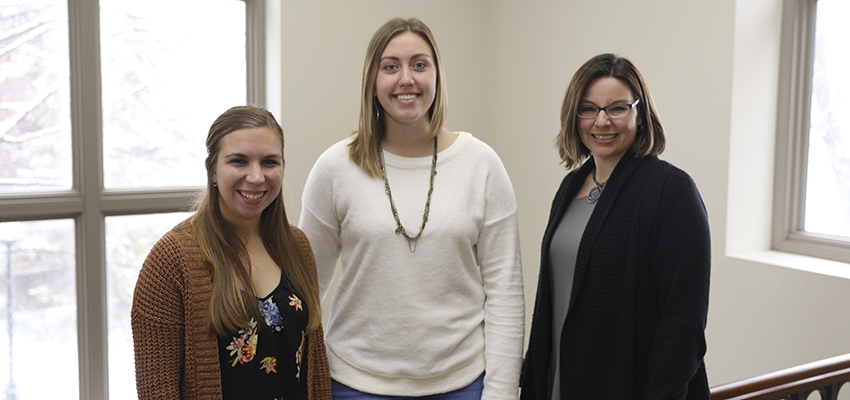
HWS News
11 April 2018 • Research Psychology Students to Present at the Society of Behavioral Medicine's Conference
Does having depressing thoughts equate to being depressed? After two years of researching the implications of cognitive styles on college students, Kelsey Arroyo '18 and Elizabeth Hawes '19 will head to New Orleans with Associate Professor of Psychology Jamie Bodenlos to present their work at the annual conference of the Society of Behavioral Medicine in April.
Arroyo, a psychology major with a minor in health professions, says the teams research involved investigating the role of cognitive fusion on the health of college students. "Cognitive fusion is a condition in which an individual mistakes inner thoughts for reality. It refers to our inability to distinguish ourselves and our experiences from our thoughts," Arroyo says. The team measured cognitive fusion in undergraduates using an extensive questionnaire.
"We were looking at the more negative effects of cognitive fusion, such as ruminating on depressing thoughts and having them fuse with your identity," Hawes adds.
"We found that after controlling for sleep, social support, mindfulness and stress, cognitive fusion was the only significant predictor of physical functioning in college students," says Hawes, a psychology major with minors in philosophy and biology. Students who had higher levels of cognitive fusion had poorer scores for the physical functioning measurement.
The take-away for the student researchers? Hawes says it's that the way we interact with our thoughts should be considered when evaluating health. "The study suggests that the way we think about and interpret the elements in our lives seems to be one of the most important factors of our overall physical functioning. Usually we attribute lower levels of functioning to things such as not getting a lot of exercise, or a lack of sleep, but we found that cognitive fusion was more important."
Bodenlos says that Arroyo and Hawes have been an integral part of her research lab. "They have been a part of research at all the different steps in the process from collecting data and running sessions to writing manuscripts," she says.
"The chance to present at a national conference attended by nearly 2,000 researchers, clinicians, educators and students is invaluable at the undergraduate level," says Bodenlos. "These experiences will make them stand out when they are applying to graduate school, as many undergraduates never get these kinds of opportunities."
Both students intend to pursue graduate degrees after their graduation. Hawes hopes to earn a Ph.D. in clinical psychology, while Arroyo will be attending the University of Connecticut for a master's degree in health promotion science.
Bodenlos, who was recently elected to the Fellowship of the Society of Behavior Medicine, is co-presenting several other sessions at the conference, including a panel discussion on leveraging the media to impact public health, and a breakfast roundtable on becoming a promoter of your discipline, along with Arroyo and others.
